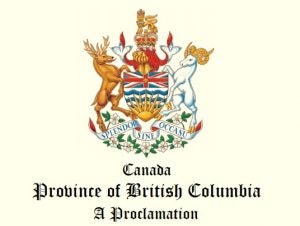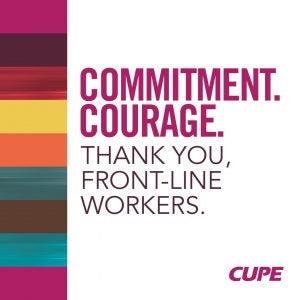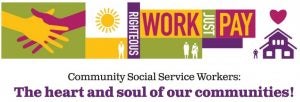
CSS BARGAINING UPDATE: CONTRACT TALKS SUSPENDED FOR17,000 UNIONIZED COMMUNITY SOCIAL SERVICES WORKERS
Collective bargaining resumed between the nine-union Community Social Services Bargaining Association (CSSBA) and the provincial Community Social Services Employers’ Association (CSSEA) this past week to negotiate a new contract for 17,000 unionized workers in the sector.
However, on Monday, talks were suspended after the latest proposal put forward by the employers’ association failed to meet the needs identified by workers in the sector.
Members have been clear about their priorities and what they want representatives at the bargaining table to bring forward. These priorities include a fair and equitable compensation package that will help lighten the pressure of rising costs, meaningful recognition of rights for Indigenous workers and the ability to address members’ own health needs, including mental health supports.
Community social services sector workers support some of the most vulnerable members of our society. The bargaining committee is working hard to bring us all a contract that will take care of us as workers, and that enables us to provide quality care for the people that we support in our work.
As we are negotiating, the global health pandemic is entering its third year and your workplaces are critically short-staffed. During the pandemic, many members were required to remain at work. Now we are pushing for them to be considered as important at the bargaining table too.
Unfortunately, we are still not there. This past week, our discussions have been challenging and we are still not reaching an agreement on some of the most fundamental priorities that we believe will make the difference for members.
We are working towards true reconciliation which means that all Indigenous workers are respected, and their cultural needs are valued. We are seeking improvements that recognize the cultural capacity and competency that is required to support Indigenous families when working in Indigenous agencies. These improvements should reflect the value our members bring to communities. Government has expressed a strong commitment to reconciliation, and we believe this commitment should also be reflected in your Collective Agreement.
We are not prepared to bring an agreement back to members that does not value our work and addresses our basic needs and priorities. We are working towards an agreement that not only puts more money in members’ pockets but enables you to take care of your health and have a safe workplace.
We are still fighting for a compensation package that protects against rising costs and addresses a root problem in our sector: recruitment and retention. If our communities are going to keep the skills and experience we already have in our sector and recruit the next generation, we need a compensation package that is attractive and competitive.
The employers’ association have different ideas to address the systemic issues in the sector. But we have heard from members about the priorities that will make the difference in the workplace and at home and we continue to find way to ensure that these priorities are reflected in the agreement we bring back to members.
What comes next?
We will be back to the negotiating table at a later date to continue this fight. And we will keep you in the loop as we continue these discussions.
Community Social Services Awareness Month: Honouring our members’ commitment
BURNABY—March is Community Social Services (CSS) Awareness Month. As the world marks the one-year anniversary of the COVID-19 pandemic, CUPE BC honours and appreciates the more than 3,500 CUPE members who work in community social services. These include community support workers for the developmentally challenged, employment counsellors, addiction counsellors, legal advocates, early childhood educators and more.
B.C.’s frontline community social service workers and agencies help build safe and caring communities that support everyone when they need it—especially our most vulnerable citizens. Community social services are critical to B.C.’s safety net because they help make sure that people in need don’t fall through the cracks.
The work CUPE CSS members do has become all the more critical during this global pandemic. In these times of crisis, already vulnerable clients experience increased mental and emotional stress around loss of income, access to housing, social distancing, and other challenges. This increases the burden for the community social service workers who are there to help them.
“Since the pandemic was declared we’ve seen a big increase in overtime, with some of our members putting in 60-to-80-hour weeks,” says CUPE BC CSS Committee member Bob Crozier, a CUPE 523 member who works at the Turning Points emergency centre in Vernon. “They’re putting in these extra hours while facing a number of challenges imposed by COVID-19.”
Challenges include training clients in various COVID protocols, and stress caused by fatigue, general safety concerns, and increased isolation—for both clients and staff—as a result of staff shortages and social distancing. Home visits for outreach programs have been severely curtailed by provincial health orders. And staff working in residential treatment programs for children face uncertainty over parental decisions on whether to keep kids at home or in the program full-time.
CUPE CSS members are expected to work, and they keep on working—some despite having yet to receive pandemic pay and despite uncertainty around safety issues. Community social service workers keep on providing these vital public services because they are committed to helping people. That’s why they’re the heart and soul of our communities.
Community Social Services Awareness Month_ Honouring our members’ commitment – CUPE BC
Joint statement recognizing the role of B.C.’s community social services workers
Nicholas Simons, Minister of Social Development and Poverty Reduction, and Mitzi Dean, Minister of Children and Family Development, have issued the following statement in recognition of Community Social Services Awareness Month, March 1 to 31, 2021:
“Community Social Services Awareness Month is a perfect time to take a moment to thank one of the over 42,000 people who work in the community social services sector for their resilience and dedication to their role. They make a huge difference in our communities.
“Over the past year, as we’ve grappled with COVID-19, community social services agencies have been there to provide support and assistance. They’ve stepped up by adapting their services and coming up with innovative solutions to deliver the programs and services British Columbians need, in often trying circumstances.
“Community social services agencies help people with physical and developmental disabilities, families of children with support needs, new Canadians and refugees, Indigenous individuals, people dealing with mental health and/or substance use issues, and so many more to meet a huge variety of needs within the community.
“Most of us know an individual or family who has turned to the sector for help. Whether it’s a newcomer looking for language skills training or work experience before starting a job search, a woman looking for shelter and support to exit an abusive relationship, a youth in need of safe counselling services or a senior looking for help to access a local food bank, community social services workers are there to provide help and support.
“Community social services workers set the foundation of supports and services that people often turn to when they need help. Their dedication and hard work are a mainstay of government’s family and community support systems.
“As we look forward to building back a strong and stable economy and a better future for all British Columbians, community social services agencies will continue to be there to play a vital role.
“We thank them for all they do.”
Learn More: For the Community Social Services Awareness Month Proclamation, visit: https://www.bclaws.gov.bc.ca/civix/document/id/proclamations/proclamations/CommSocSerAwarenessMonth2021

- Crisis Centre: 1-800-SUICIDE (1-800-784-2433)
- 310-Mental Health Support: 310 6789
- B.C. 211 hotline for seniors: Call 2-1-1
- Nurse’s Hotline: 8-1-1
- Kid’s Help Phone 1-800-668-6868
- Alcohol & Drug Information & Referral Service: 1-800-663-1441



